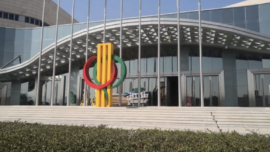President José Maria Neves has called for a reform of the UN Security Council, with representation for Africa, and urged Cabo Verde to re-apply for non-permanent membership.
“It would be a way of increasing the country’s external visibility, prestige and usefulness in the international arena,” said José Maria Neves in his opening speech at the Annual Foreign Policy Conference.
Organised by the Cabo Verde Ministry of Foreign Affairs, Cooperation and Regional Integration, the conference takes place in Praia until Tuesday in a hybrid format, with speeches from several national and international guests, such as the president of the Global Alliance for Vaccines (GAVI), José Manuel Durão Barroso, the UN Under-Secretary-General and High Representative for Least Developed Countries, Landlocked and Small Island Developing States (HRLLS), Courtenay Ratray, under the theme “Challenges for Cape Verdean diplomacy in the face of the pandemic.
At the opening, the Head of State said that the Security Council should be reformed in order to give member states a greater say in decisions relating to international peace and security.
“The time has come for the Security Council to be more representative and expanded, reserving the right to permanent seats for Africa. Our continent has the resources, talent and imagination to be one of the most important political and economic players of this 21st century,” he said.
In a scenario of economic recession – almost 15% of GDP in 2020 due to the absence of tourism – and “setbacks in relevant social areas and in a global context of high instability, ambiguities and unpredictability”, he pointed out that foreign policy “should be equated in the face of the pandemic and its repercussions”.
“As we will have to live with Covid-19 and its mutations for a few more years, in addition to the need for a strong and concerted onslaught on the so-called ‘Vaccine Diplomacy’ front, this global crisis is also an opportunity for the African continent to act to produce vaccines and medicines to address this and other pandemics,” he said.
The aim is to “respond to the shameful situation of inequality in the distribution and access to vaccines and contribute to strengthening the health and health security sectors on the African continent, and perhaps, in this way, also contribute to faster socio-economic recovery worldwide,” he emphasised.
The head of state argued that extending and strengthening the Special Partnership with the European Union was a “valuable instrument for the development and competitiveness” of the archipelago, and that it was necessary to extend it, “to other relevant actors, such as companies, local authorities, NGOs, universities and researchers.
Within the Community of Portuguese-language Countries (CPLP), Cabo Verde’s participation, he said, “should be based on furthering the gains that have already been achieved”, particularly “in the area of the partnership for mobility as an instrument for promoting the mobility of people, goods and cultural, economic and scientific activities”.
“In other words, we must place diplomacy for mobility at the service of Cultural and Economic Diplomacy”.
Also speaking at the opening session of the conference, dedicated over two days to foreign policy, the Minister of Foreign Affairs, Rui Figueiredo Soares, stressed that “multilateralism revisited needs to be consolidated”.
“And in it we should continue to invest, not only to mitigate the immediate effects of the pandemic, but also as a means to solve many of the other threats that afflict the world and that impend the achievement of sustainable development and the necessary investments for the pursuit of sustained peace”.
The mobilisation of resources, including vaccines, was valued by the Cape Verdean head of diplomacy at a time when the archipelago has already received a total of 945,220 doses of vaccines, donated by international partners, enough to vaccinate about 472,610 people.




















